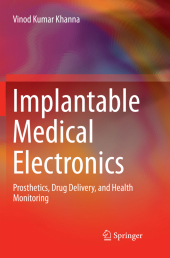 Neuerscheinungen 2019Stand: 2020-02-01 |
Schnellsuche
ISBN/Stichwort/Autor
|
Herderstraße 10
10625 Berlin
Tel.: 030 315 714 16
Fax 030 315 714 14
info@buchspektrum.de |

Vinod Kumar Khanna
Implantable Medical Electronics
Prosthetics, Drug Delivery, and Health Monitoring
Softcover reprint of the original 1st ed. 2016. 2019. xxxiii, 453 S. 134 Farbabb., 54 Tabellen, 134 Far
Verlag/Jahr: SPRINGER, BERLIN; SPRINGER INTERNATIONAL PUBLISHING 2019
ISBN: 3-319-79791-3 (3319797913)
Neue ISBN: 978-3-319-79791-5 (9783319797915)
Preis und Lieferzeit: Bitte klicken
This book is a comprehensive, interdisciplinary resource for the latest information on implantable medical devices, and is intended for graduate students studying electrical engineering, electronic instrumentation, and biomedical engineering. It is also appropriate for academic researchers, professional engineers, practicing doctors, and paramedical staff. Divided into two sections on Basic Concepts and Principles, and Applications, the first section provides an all-embracing perspective of the electronics background necessary for this work. The second section deals with pacing techniques used for the heart, brain, spinal cord, and the network of nerves that interlink the brain and spinal cord with the major organs, including ear and eye prostheses.
The four main offshoots of implantable electronics, which this book discusses, are:
The insertion of an implantable neural amplifier for accurate recording of neural signals for neuroengineering studies
The use of implantable pulse generators for pacing the activities of diseased organs
The use of implantable sensors for observing the influence of therapy and monitoring a patient´s biological parameters
The use of drug delivery systems to supervise the supply of accurate doses of medicine to affected parts
Readers will also find chapters on the ess entials of clocking and timing circuits, pulse generator circuits, neural amplifiers, batteries, biomaterials and biocompatibility, and more. Unique to this book is also a chapter on cyber security and confidentiality concerns with implants. End-of-chapter questions and exercises help readers apply the content to practical use, making this an ideal book for anyone wishing to learn more about implantable devices.
Vinod Kumar Khanna received the Ph.D. degree in physics from Kurukshetra University, Kurukshetra (Haryana), India, in 1988. From 1977 to 1979, he was a Research Assistant with the Physics Department, Lucknow University. He joined the solid-state devices division of Council of Scientific and Industrial Research (CSIR)-Central Electronics Engineering Research Institute (CEERI), Pilani in April, 1980. During his tenure of more than 34 years of service at CSIR-CEERI, he worked on various research and development projects on thin-film aluminum oxide humidity sensor, power semiconductor devices (high-current and high-voltage rectifier, high-voltage TV deflection transistor, power Darlington transistor, fast switching thyristor, power DMOSFET and IGBT), PIN diode neutron dosimeter and PMOSFET gamma ray dosimeter, ion-sensitive field-effect transistor (ISFET), microheater-embedded gas sensor, capacitive MEMS ultrasonic transducer, and other MEMS devices. He superannuated in November 2014 as Chief Scientist & Head, MEMS & Microsensors Group, and Professor, AcSIR (Academy of Scientific & Innovative Research). Presently, he is working as an Emeritus Scientist, CSIR and Emeritus Professor, AcSIR. His research interests are micro- and nanosensors, and power semiconductor devices. He is a fellow of the Institution of Electronics & Telecommunication Engineers (IETE), India. He is a life member of Indian Physics Association (IPA), Semiconductor Society (India), and Indo-French Technical Association (IFTA).
Dr. Khanna has published 8 previous books, 6 chapters in edited books, and 175 research papers in national/international journals and conference proceedings; he holds two US and two Indian patents.


